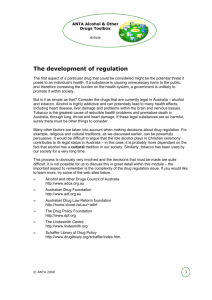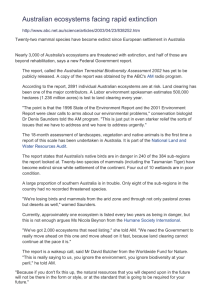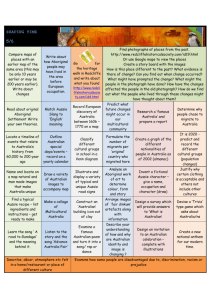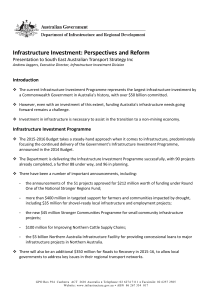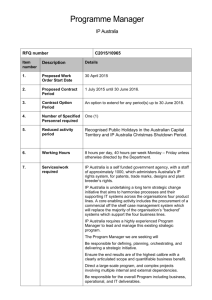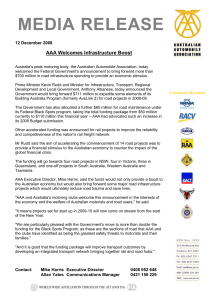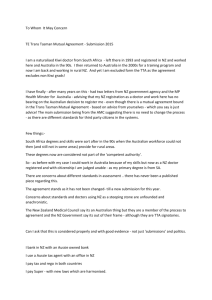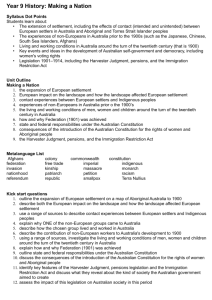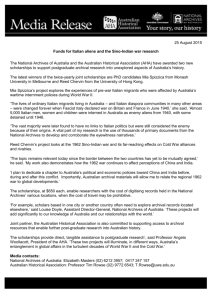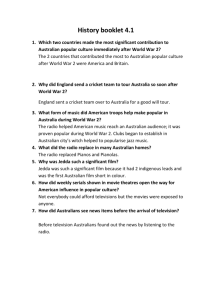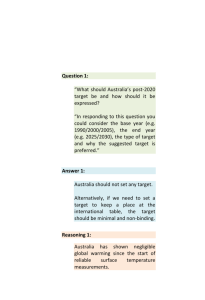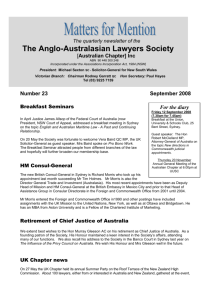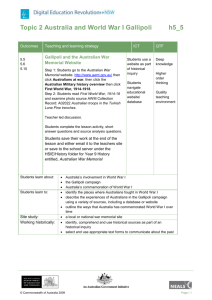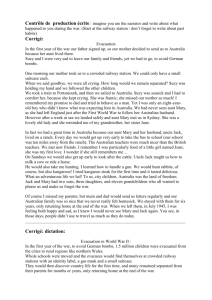Letter from Australia Coming from the complete darkness of
advertisement
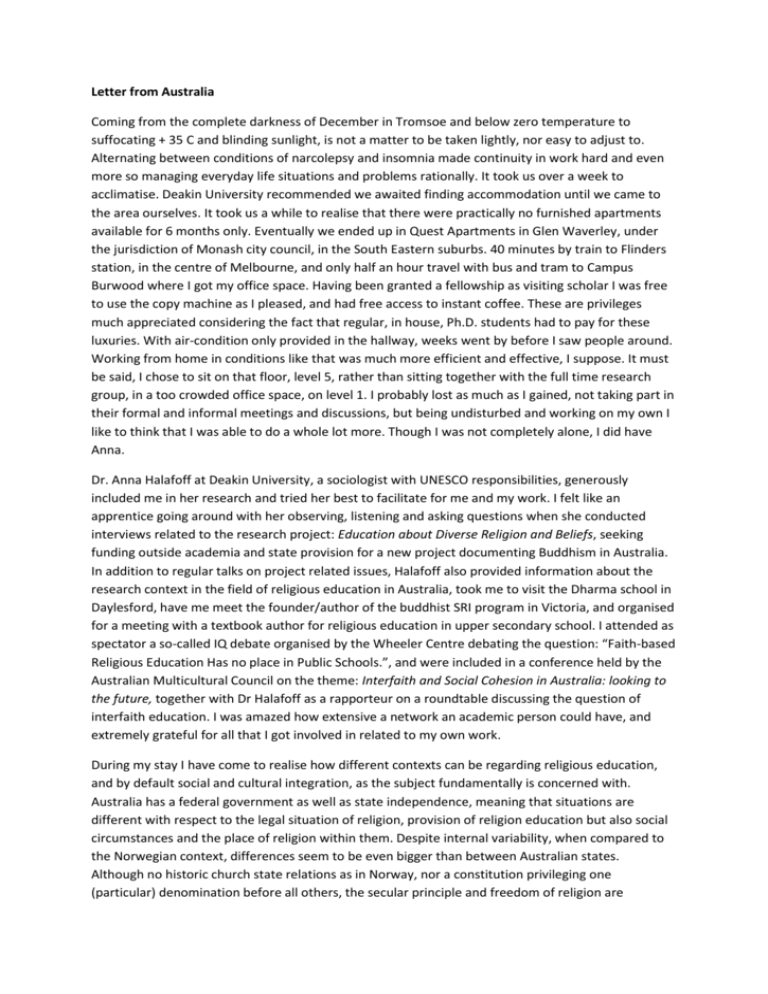
Letter from Australia Coming from the complete darkness of December in Tromsoe and below zero temperature to suffocating + 35 C and blinding sunlight, is not a matter to be taken lightly, nor easy to adjust to. Alternating between conditions of narcolepsy and insomnia made continuity in work hard and even more so managing everyday life situations and problems rationally. It took us over a week to acclimatise. Deakin University recommended we awaited finding accommodation until we came to the area ourselves. It took us a while to realise that there were practically no furnished apartments available for 6 months only. Eventually we ended up in Quest Apartments in Glen Waverley, under the jurisdiction of Monash city council, in the South Eastern suburbs. 40 minutes by train to Flinders station, in the centre of Melbourne, and only half an hour travel with bus and tram to Campus Burwood where I got my office space. Having been granted a fellowship as visiting scholar I was free to use the copy machine as I pleased, and had free access to instant coffee. These are privileges much appreciated considering the fact that regular, in house, Ph.D. students had to pay for these luxuries. With air-condition only provided in the hallway, weeks went by before I saw people around. Working from home in conditions like that was much more efficient and effective, I suppose. It must be said, I chose to sit on that floor, level 5, rather than sitting together with the full time research group, in a too crowded office space, on level 1. I probably lost as much as I gained, not taking part in their formal and informal meetings and discussions, but being undisturbed and working on my own I like to think that I was able to do a whole lot more. Though I was not completely alone, I did have Anna. Dr. Anna Halafoff at Deakin University, a sociologist with UNESCO responsibilities, generously included me in her research and tried her best to facilitate for me and my work. I felt like an apprentice going around with her observing, listening and asking questions when she conducted interviews related to the research project: Education about Diverse Religion and Beliefs, seeking funding outside academia and state provision for a new project documenting Buddhism in Australia. In addition to regular talks on project related issues, Halafoff also provided information about the research context in the field of religious education in Australia, took me to visit the Dharma school in Daylesford, have me meet the founder/author of the buddhist SRI program in Victoria, and organised for a meeting with a textbook author for religious education in upper secondary school. I attended as spectator a so-called IQ debate organised by the Wheeler Centre debating the question: “Faith-based Religious Education Has no place in Public Schools.”, and were included in a conference held by the Australian Multicultural Council on the theme: Interfaith and Social Cohesion in Australia: looking to the future, together with Dr Halafoff as a rapporteur on a roundtable discussing the question of interfaith education. I was amazed how extensive a network an academic person could have, and extremely grateful for all that I got involved in related to my own work. During my stay I have come to realise how different contexts can be regarding religious education, and by default social and cultural integration, as the subject fundamentally is concerned with. Australia has a federal government as well as state independence, meaning that situations are different with respect to the legal situation of religion, provision of religion education but also social circumstances and the place of religion within them. Despite internal variability, when compared to the Norwegian context, differences seem to be even bigger than between Australian states. Although no historic church state relations as in Norway, nor a constitution privileging one (particular) denomination before all others, the secular principle and freedom of religion are interpreted and acted upon differently. Religion comes out in this context as a positive, seen among other things as contributing to the social and moral order of society, either directly or indirectly, and by example through providing social services. Taking this further, as the Danish historian of religion Tim Jensen (2008) says, the way a nation state has religious education, says a lot about how secular their society is. Instead of providing an integrative religious education (Alberts, 2007) as in Norway, teaching about different religions, in Australia the religious communities are allowed entrance into school giving confessional instruction into one religion. In addition several states has allowed provision for schools to have a chaplain supporting the learning environment in general and students in particular, morally and psychologically. A general religious education comparable with the subject given in the Norwegian educational system, as I am especially concerned with in my project, are implemented in the last two years in college, year 11 and 12, and then only as an elect subject in the Victorian Certificate of Education. By taking this “journey” (native Indian cultural metaphor), I have not only changed direction in my project I have also been able to make it more manageable and approach it more directly. Focusing solely on the representation of Buddhist religion and culture in religion education textbooks in Australian and Norwegian upper secondary education, as an example of how minority perspectives are included/integrated in the educational context and treated in a school subject learning about different religions and cultures, the project has become a comparative exercise on more than one level. Trying to take benefit from the experience of being in Australia and the different perspectives evolving from this context, historically, sociologically and legally, I have come to see how nation states such as Norway and Australia understand and manage cultural difference structurally and professionally, and hopefully as a consequence I hope to see some of the issues pertaining to this subject and field more clearly. One personal lesson from this journey is to never underestimate practical circumstances and doings, and the importance of reconciliation with bureaucracy and cultural workings having a formal, artificial/instrumental nature. The whole process of getting a school place for my girls Ariana and Ennea almost took away my spirit of coming to Australia. Extensive communication with authorities through phone and email, spending hours filling out documents and paying large amounts of money, is nothing but painful unless you have a certain like for these kind of things. When the existential doubt, uncertainty and worrying regarding family matters that are bound to happen in situations like these (and with them the implicated situations and conflicts) was resolved, working was made a lot easier. There was fun too, for the whole family; experiences concerning beaches, adventure parks, aqua parks, skate parks, playgrounds, and more. Meeting other people coming from and having other cultures and ways of doing things, always is a treat. Befriending a greek family means feasts of food and hours of talking and laughing. Hooking up with the local soccer-team, Waverley Victory, gave some ideas and impressions about migrant communities, “diaspora experiences” and hybrid identities. A group of second generation Italians; friends that used to play together in childhood and youth, now using soccer as an excuse to be hanging out and having fun in a serious way. There are so many great people in this world. Being included in this community and taken such good care of had me doubt my innate misanthropic tendencies. Needless to say I felt sad about leaving and saying farewell. The best thing with the whole journey was my children’s admirable resilience. Overcoming the barriers of not understanding nor speaking the English language, to in many ways become even more proficient talkers than their parents. To be able to communicate their thoughts and feelings in a foreign language, relating to other English speaking people and befriending children their own age, after just a few months was a joy to watch and incredible listening to. I could not be more proud. In three months the two 6 and 4 year old girls, learned the language sufficiently to live happily in a completely different environment. To be capable of speaking with such ease, making friends and establishing a sense of identity in the midst of a group of native speakers, was nothing but unbelievable. Having children also gave me an opportunity to experience the Australian educational system and school context first hand. Sitting in a few hours the first week after enrolment gave me some insight into a system and way of working, not completely different but still not too similar to our own. Their constant focus on metacognition and communication about learning stood out. I especially loved the way the teacher reproached the students either behaving inappropriate or answering questions without thinking. Priceless! So, thank you NAFOL, for contributing to my Australian experience and have me working on my thesis in this environment so different from home.



